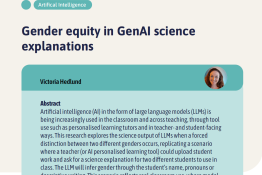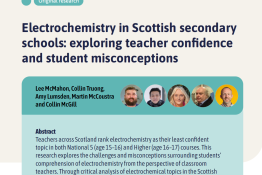Five evidence-based strategies to plan and implement practical science lessons (open access)
Issue 395 | Page 18 | Published Nov 2025
Description
Susie d’Espagnac shares how she helps prepare student teachers to embed routines into practical science lessons.
References
Boxer, A. (2020) Practicals; Why you should take them slow. Education in Chemistry.
https://edu.rsc.org/ideas/practicals-why-you-should-take-them-slow/4012186.article
Gatsby Foundation (2017) Good Practical Science. www.gatsby.org.uk/app/uploads/sites/2/2025/07/good-practical-science-report.pdf
Hamlyn, B., Brownstein, L., Shepherd, A., Stammers, J. and Lemon, C. (2023) Science Education Tracker 2023. London: The Royal Society.
https://royalsociety.org/news-resources/projects/science-education-tracker
Hodson, D. (2014) Learning science, learning about science, doing science: different goals demand different learning methods. International
Journal of Science Education, 36(15), 2534–2553.
Holman, J. and Yeomans, E. (2018) Improving Secondary Science Guidance Report. Education Endowment Foundation.
https://educationendowmentfoundation.org.uk/education-evidence/guidance-reports/science-ks3-ks4
Lyman, F. (1981) The responsive classroom discussion. In Mainstreaming Digest, ed. Anderson, A. S. pp.109–113. College Park, MD: University of
Maryland College of Education.
Ofsted (2021) Research Review Series: Science.
www.gov.uk/government/publications/research-review-series-science/research-review-series-science#fn:165
Toplis, R. and Allen, M. (2012) ‘I do and I understand?’ Practical work and laboratory use in United Kingdom schools. Eurasia Journal of
Mathematics, Science and Technology Education, 8(1), 3–9.
Vorholzer, A., von Aufschnaiter, C. and Boone, W. J. (2020) Fostering upper secondary students’ ability to engage in practices of scientific
investigation: a comparative analysis of an explicit and an implicit instructional approach. Research in Science Education, 50(1), 333–359.
More from this issue
Abstract
Artificial intelligence (AI) in the form of large language models (LLMs) is being increasingly used in the...
Henry Ward shares a linguistic–rhetorical approach to building higher-order literacy skills in science.
Resource production...
Abstract
Teachers across Scotland rank electrochemistry as their least confident topic in both National 5 (age 15–16) and...




